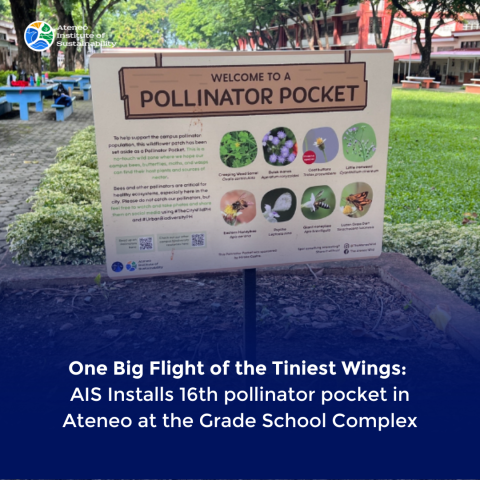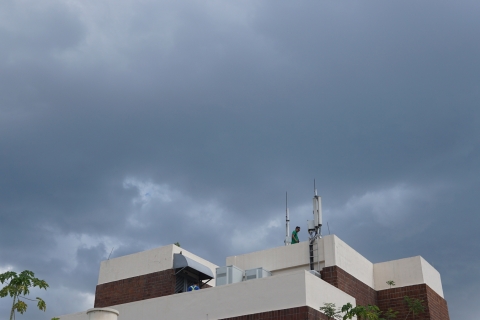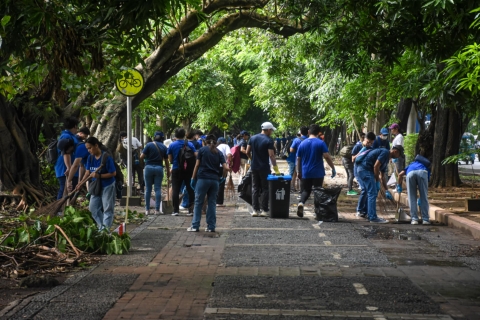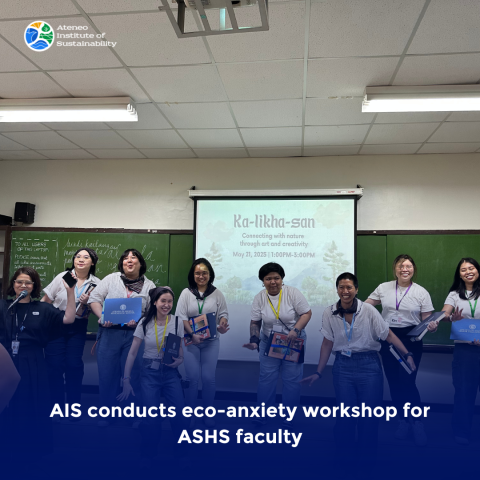Army Green Camps Program: Embracing Food Self-Sufficiency as New Normal
07 Nov 2020 | Maj Franco Salvador M. Suelto (INF) PA
Background
The Corona Virus 2019 (COVID-19) pandemic had far-reaching consequences beyond the spread of the disease itself and efforts to contain it, including social and economic implications. It affected the global food supply chain and several industries. The pandemic caused disruption of global flows of goods, capital, manufacturing and labor, which resulted to shortage of local food supply and loss of livelihood in various sectors.
Relatedly, different regional and provincial capitals, particularly the National Capital Region and Cebu, experienced disruption in food production and manufacturing. An economic recession is expected as a direct result of closure of medium-enterprise companies and businesses. Restrictions and work stoppages of industries such as tourism, airline, hospitality, and travel are also part of the mounting challenges. Moreover, Overseas Filipino Workers in countries affected by the pandemic have quit work and have returned to the country. The abovementioned issues can be magnified and exploited by different threat groups, particularly the Communist Terrorist Group (CTGs) and its legal fronts.
The country’s vast track of idle lands is suitable for agriculture initiatives. It can boost the Army’s support to the nation-building agenda of the Government in both urban and rural areas. Incidentally, all Philippine Army Major Units (PAMUs) and its subordinate units Army-wide are currently implementing and promoting various farming and urban gardening projects in their respective camps and localities. The agriculture-based initiatives complemented various government agencies’ programs that serve as venue for convergence efforts between the Philippine Army and stakeholders benefitting internal and external audiences.
Army Green Camps Program Initiative
The launching of the Army Green Camps Program (AGCP) is nothing new to soldiers as various field units of the Army had their respective backyard gardening activities or we can say a semblance of Department of Agriculture’s “Plant, Plant, Plant” also known as “Ahon Lahat, Pagkaing Sapat (ALPAS) Kontra sa COVID-19” initiative. However, what set this Army planting program apart was the formalized partnership between stakeholders that will institutionalize, solidify and sustain the relationship between the Philippine Army and key agriculture stakeholders. Moreover, the partnership will ensure the sustainability of the AGCP through the technical assistance that will be provided by the partner stakeholders.
The signing of a Memorandum of Partnership between the Philippine Army (PA) & the Department of Agriculture (represented by Bureau of Fisheries & Aquatic Resources, Bureau of Plant Industry and Philippine Coconut Authority), and the PA & the Tarlac Heritage Foundation, Inc resulted in various commitment in propagating and sustaining the program nationwide in support to the overall military campaign.
Signing of Memorandum of Partnership
The Philippine Army represented by Vice Commander, MGEN REYNALDO MEJIA AQUINO PA , led the official launching of the “Army Green Camps” Program last June 20, 2020 at the Headquarters, Philippine Army. The agriculture-based initiative is envisioned to support the government’s effort to address the socio-economic impact of Covid-19 pandemic and help address potential social unrest brought about by opportunistic communist and other local threat groups
Campaign “Accelarators” and Line of Efforts (LOE)
In the Armed Forces of the Philippines (AFP) campaign, the main clearing tool for counter-insurgency is the conduct of Community Support Program (CSP). It is a community and issue-oriented AFP operational concept employed in conflict areas. It contributed immensely to the success of overall degradation of threats to national security particularly the Communist Terrorist Groups (CTGs) capability and its influence in the countryside and urban areas. As such, the AGCP can be used as a program to entice our target audience in the community to support not only the Philippine Army initiatives in food self-sufficiency but also the Department of Agriculture as well as other government agencies’ “convergence programs” towards peace and development in different localities.
The AGCP specific objectives will complement focused military operations by serving as “accelerators” for military campaign successes as follows:
- To serve as a support program to reinforce the food self-sufficiency program of the government and strengthen local partnership between the Local Government Units (LGUs), Local Government Agencies (LGAs) and other stakeholders with PAMUs;
- To support the AFP’s Lines of Efforts (LOEs) on #3 – Civil-Military Operations (CMO), #5 – Resource Control Operations, and #6 – Key Leaders Engagement;
- To serve as a platform for convergence efforts that can support the AFP’s Lines of Efforts #7 – Community Support Program (Red/White/Preventing and Countering Violent Extremism);
- To serve as an additional tool for PAMU commanders in their Information Operations (IO) efforts;
- To deter/prevent enemy propaganda against the efforts of the government in addressing the threat of COVID 19; and
- To sustain good rapport with the communities while promoting a brand image of the PA.
The AGCP also encourages purposive engagements in the “Whole of the Nation” approach as embodied in the National Task Force in Ending Local Communist Armed Conflict (NTF-ELCAC). Specifically, the Poverty Reduction, Livelihood and Employment Cluster (PRLEC) of the NTF-ELCAC, that includes the Technical Education and Skills Development Authority (TESDA), Department of Agriculture (DA), Department of Social Welfare and Development (DSWD), Department of Trade and Industry (DTI), Deparment of Labor and Employment (DOLE), Development Bank of the Philippines, and other agencies, will serve as the inter-agency platform for collaboration and covergence with different national and local departments. Particularly, the PAMUs will engage regional and provincial agriculture offices and civilian agro-industrial companies in their respective localities to assess the feasibility of the AGCP concept implementation and enhance capacities of Army units regarding the maintenance and sustainability of the program through their respective Agri-based support services and technical assistance.
More importantly, the AGCP will serve as an additional tool for PAMU commanders in their IO efforts and deter enemy propaganda hampering the efforts of the government to curtail the threat of COVID-19. It will showcase the non-combat/non-traditional means of defeating the will of the enemy to fight as well as creating space for collaborative efforts from other government agencies and the community leading to gaining popular support in favor of the Philippine Army.
Food Self-Sufficiency and Food Security
The Army Green Camps Program is intended to encourage major portion of the population to venture into farm livelihood, renew interest in food self-sufficiency, and impress the importance of agriculture as a driver of the economy by supporting various government agricultural programs. The AGCP will harness the skills and manpower capability of the whole Philippine Army to redirect its energy in developing “model farms or farm laboratories” that can serve as classroom for the community to learn advanced agricultural methodologies and innovations in support to countryside development.
It is a food resiliency action plan modeled to support various relevant government economic and food self-sufficiency programs based on the four (4) core food systems: (1) Food access; (2) Farming viability; (3) Sustainability; and, (4) Support for local food systems plans and policy. Corollary to this, the program promotes the Army’s image as an enabling agent and catalyst in promoting greater resiliency on domestically-produced foods, and sustainable farming practices to the community.
Conclusion
All soldiers must recognize the value of the AGCP on the past and current efforts of PAMU and unit commanders to forward PA objectives through forward-thinking agricultural initiatives. It is an effort to integrate, converge, and support the existing various farming and urban gardening projects of PAMUs and subordinate units while performing our core function of warfighting. At present, numerous projects have shown promising success that translated into significant milestones the Army hopes to sustain.
Food self-sufficiency and security is an essential factor in nation building particularly during this COVID-19 pandemic. The AGCP will complement existing programs and initiatives to increase food production while soldiers engage in their primary mission. Overall, the AGCP is a timely and relevant program that embraces the culture of food self-sufficiency as part of the new normal.
LIEUTENANT GENERAL GILBERT I GAPAY PA said, “Through this program our soldiers will be given an option to augment their livelihood and become more self-sufficient and not dependent on outside sources during this COVID-19 pandemic. The AGCP will also produce healthy food choices for the soldiers that can help them in accomplishing the Army’s mission of serving the people and protecting the communities.”
The author is a graduate of Royal Military College of Australia Winter Class of 2006. He is also a graduate of Bachelor in Psychology at University of Santo Tomas and currently enrolled as a scholar of Master’s in Public Management at Ateneo School of Government Loyola Campus. He is part of the team that wrote the Philippine Army Civil-Military Operations Manual series 2019, Peacebuilding Operations Handbook 2018 and Philippine Army Preventing & Countering Violent Extremism Handbook. His interest is reading classical military strategy books and suspense thriller books by James Patterson. Aside from the service, he finds value in spending quiet time with his family.





